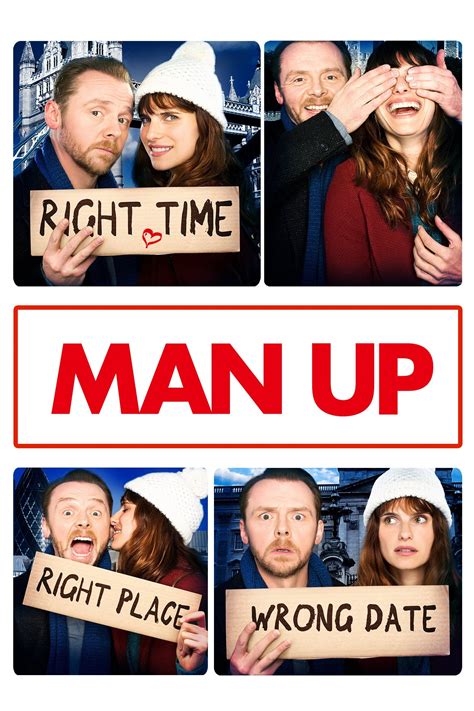Man Up

Description:
Man Up follows Nancy, a single Londoner who, on a blind date arranged by a friend, ends up sharing a spontaneous night out with a charismatic stranger named Jack after a mistaken cue. Their mismatched expectations evolve into a witty, awkward romance as they navigate timing, honesty, and the courage needed to believe in love again. Set against a brisk, contemporary city backdrop, it’s a warm British rom-com about second chances and connection.Keywords:
Mismatched Partners, Romantic Comedy, British Film, London Setting, Meet CuteWhat does the phrase man up mean?
In the context of the movie "Man Up," the phrase "man up" typically means to take responsibility, face challenges bravely, and act with maturity and confidence. It can imply stepping up to confront difficult situations or making tough decisions, often associated with traditional notions of masculinity. However, the film also explores the complexities of relationships and the pressure of societal expectations on men, highlighting that vulnerability and emotional honesty are equally important. The phrase can thus carry both positive and negative connotations.
Is Man Up worth watching?
"Man Up" is a romantic comedy featuring Lake Bell and Simon Pegg, centered around a case of mistaken identity that leads to an unexpected connection. The film is praised for its witty dialogue, engaging performances, and a fresh take on the rom-com genre. It explores themes of love, honesty, and the challenges of modern dating. If you enjoy light-hearted romantic comedies with a blend of humor and heartfelt moments, "Man Up" is worth watching for its charm and chemistry between the leads.
What is the plot twist in Man Up?
In the romantic comedy "Man Up," the plot twist occurs when the protagonist, Nancy, who is mistaken for a woman named Jessica, goes on a date with Jack, who is unaware of the mix-up. As their connection deepens, the truth about her identity creates tension. The twist lies in the fact that Nancy initially deceives Jack, leading to complications as she grapples with her feelings for him while hiding the truth. Ultimately, the film explores themes of honesty and vulnerability in relationships, culminating in a heartfelt resolution.
Why shouldn't we say "man up"?
The phrase "man up" is often criticized because it perpetuates harmful stereotypes about masculinity, suggesting that expressing emotions or vulnerability is a sign of weakness. This can discourage men from being open about their feelings and seeking help when needed, contributing to mental health issues. Additionally, it reinforces gender norms that can be damaging to both men and women, implying that strength is inherently tied to gender. Promoting emotional expression and vulnerability is healthier and more supportive for everyone, regardless of gender.
Explore More Categories:
Peculiarities Domestic Tension Childhood Retro Aesthetic Hacking Rock Power Dynamics Resurrection Moral Dilemma Sibling Dynamics Alternate Timeline Compulsion Perfectionism British Community Theater Intimate Journey Mandalorian Home Invasion Betrayal Indigenous Cinema Trauma Paradox Iceland Urban Decay Circus